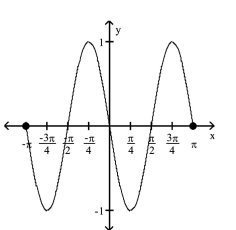Multiple Choice
Determine whether the graph is that of a function. If it is, use the graph to find its domain and range, the intercepts,
if any, and any symmetry with respect to the x-axis, the y-axis, or the origin.
-
A) function domain: 
Range: { 
Intercepts: 
Symmetry: origin
B) function domain: 
Range: 
Intercepts: 
Symmetry: none
C) function domain: all real numbers
Range: 
Intercepts: 
Symmetry: origin
D) not a function
Correct Answer:

Verified
Correct Answer:
Verified
Q10: Find the domain of the function.<br>-f(x)= 2x
Q11: Determine whether the equation defines y as
Q12: For the given functions f and g,
Q13: Find the value for the function.<br>-Find f(-x)when
Q14: Solve the problem.<br>-A retail store buys 35
Q16: Solve the problem.<br>-The function f(t)= <img src="https://d2lvgg3v3hfg70.cloudfront.net/TB8253/.jpg"
Q17: Determine whether the equation defines y as
Q18: The graph of a function f is
Q19: Determine whether the equation defines y as
Q20: Determine whether the relation represents a function.